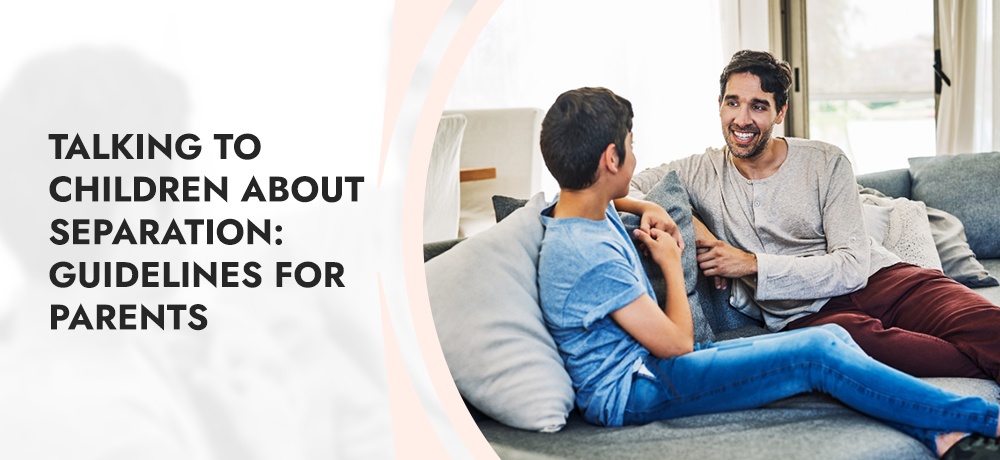
Talking To Children About Separation: Guidelines For Parents
- Allius Counselling and Family Mediation Services
Your family is changing, and your children will need help to adjust. It is always best if parents can come together to provide a carefully thought-out narrative that children can understand. Consider your child or children’s age and stage of development as you think about your messaging. In situations where there are children of different ages and stages, parents may need to plan for follow-up conversations to offer more specific details and provide more opportunities for discussion with older children.
There needs to be an agreed-upon explanation of what is happening, such as, "Your mom and I have decided it is best to live apart for a while." Stay away from saying you don't love each other. Children can assume if you can stop loving your spouse, you can stop loving them, too. Instead, try, "We used to be really good friends, but it has become harder to get along."
Provide specific information about the upcoming changes and how they may impact the children. An example might be, "I will be going to stay with your grandparents for a time while your dad and I decide on our next steps. Your dad will stay with you during the weekdays, then he will go to stay with his mom, and I will come back to spend Fridays after school until Monday mornings with you." This way, they know you have worked together on a plan, which increases feelings of security.
Offer opportunities for them to ask questions and encourage your children to express their feelings about what is happening. Even though this conversation may be stressful for parents to have with their children, how parents communicate at this time can be beneficial in setting the right tone for future conversations. In some situations, parents should consider the services of a child counselor or play therapist.
Take the time to consider how, when, and where to tell your children. Ideally, the news should be shared prior to physical separation but not too far in advance of the change occurring. Allow for enough time for children to discuss it with you, but not so long that they are living in a tense situation.
It is critical to put aside feelings of resentment, anger, or sadness in order to be sensitive, first and foremost, to the children and their need for a supportive message. It is key for parents to stay calm and use a controlled tone, avoiding angry accusations. Never undermine the other parent's love or relationship with the children. Choose a private place where children can feel most comfortable and where there will be minimal interruptions. Usually, this would be the family home. The siblings should be gathered together to encourage a feeling of family connection, with parents using "we" when communicating the decisions that have been made.
It helps children to know that the decision has been carefully considered and that their parents have been trying to work on their problems before making the decision to separate. Let them know that you understand that they may feel hurt and sad about the news, which may be different feelings than you each have about it.
Children, at least initially, may need simple explanations about the decision to separate since too much information can be overwhelming. Adult issues and details should never be shared. Younger children need simple and concrete concepts. Examples include: "We have been getting angry with each other too often and arguing too often, and because this is not a good way for adults or children to live, we are choosing to live apart." Or "We are not feeling happy when we are together anymore, and we can't seem to make it better, so we have made this decision to live apart."
Reassuring children that they will continue to be loved by both parents is crucial messaging. Children need to know and hear that separation and divorce are a "grown-up" issue between the parents and that they are not to blame; they should never believe they are responsible in any way for this happening. Ensure you give them permission to love, connect, and interact with both parents and their extended family in the future. You might say, "Just because we may not love each other romantically anymore, we still care about each other because we are both your parents. We will each continue to support you to have loving relationships with your parents and family."
It is also important to provide reassurance to the children by telling them in concrete ways what will and will not change, such as the family routines, schedules, school, etc. These messages of predictability support children to feel a sense of security during a time when there is a lot of change and upheaval in their world. Too many details at one time may be too difficult to absorb, and therefore, ongoing conversations are essential.
Allowing children's questions and expression of feelings is vital to their adjustment to the process of separation and divorce, even though this may be uncomfortable for parents to experience as they are facing their own changes and feelings. Adjusting to these significant family changes takes time, and children need to know through their own experience that both parents will be there to help them through the challenges. The first conversation is important in setting the groundwork for children to continue being resilient through the necessary next steps.
Written by Lurline Raposo, MA, Registered Clinical Counsellor and Child Psychotherapist
